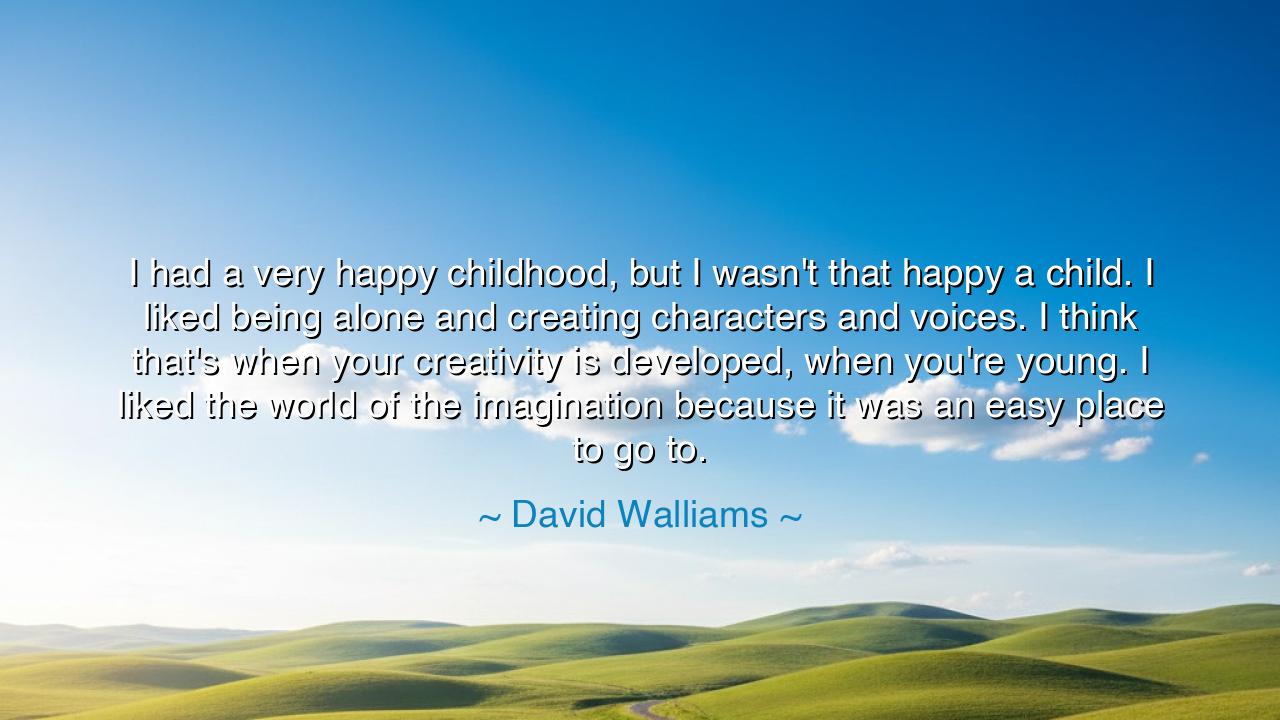
I had a very happy childhood, but I wasn't that happy a child. I
I had a very happy childhood, but I wasn't that happy a child. I liked being alone and creating characters and voices. I think that's when your creativity is developed, when you're young. I liked the world of the imagination because it was an easy place to go to.






In the reflective words of David Walliams, he once said: “I had a very happy childhood, but I wasn’t that happy a child. I liked being alone and creating characters and voices. I think that’s when your creativity is developed, when you’re young. I liked the world of the imagination because it was an easy place to go to.” This confession, tender and paradoxical, unveils the quiet truth known to all artists and dreamers: that joy and solitude often dwell side by side, and that imagination is both refuge and revelation. Walliams, the celebrated storyteller and comedian, here speaks not merely of his childhood, but of the mysterious birth of creativity — that sacred fire which often kindles first in the lonely heart.
To say “I had a very happy childhood, but I wasn’t that happy a child” is to reveal the difference between the life around us and the life within us. The world may be kind, the days filled with laughter, and yet the soul may remain slightly apart — observing, wondering, dreaming. Many who are destined to create feel this gentle dissonance from an early age. They stand among others, yet their thoughts wander through invisible worlds. They love deeply, but their truest companions are often the characters and voices that arise from within. Walliams reminds us that such solitude is not sadness, but the soil of invention — a stillness in which the imagination begins to bloom.
When he speaks of creating characters and voices, he points to the timeless act of shaping meaning from inner life. The child who invents stories does not flee reality; he expands it. In his games and fantasies, he learns empathy — to see through many eyes, to speak in many tones, to understand what it means to become. Thus, the lonely play of childhood is in truth a form of sacred training. In the quiet of his room, surrounded by imaginary friends, the young artist begins to weave the first threads of the creative destiny that will one day touch countless lives.
Walliams’ insight that “creativity is developed when you’re young” echoes the wisdom of ages. For childhood is the garden of wonder, when the world is vast, and the boundaries between dream and reality are still soft. The poet William Wordsworth once wrote that “the child is father of the man,” meaning that the innocence, curiosity, and freedom of youth shape the soul that we later become. It is in those early years — when the mind wanders unburdened by expectation — that the artist’s vision takes root. Those who learn to cherish their inner world as children will one day find it a wellspring of expression, even amid the noise of adulthood.
The world of imagination, as Walliams calls it, is both escape and enlightenment. It is “an easy place to go to,” not because it is trivial, but because it welcomes the weary heart when reality feels heavy. Yet in that escape, something miraculous happens: imagination transforms suffering into meaning, loneliness into creation, silence into voice. It is in the imaginary world that the artist first learns that every emotion — even melancholy — can be turned into beauty. Thus, the imaginative child is not merely hiding from life, but learning how to shape it.
Consider the story of Hans Christian Andersen, the great Danish storyteller. As a boy, he was awkward, poor, and often alone. Mocked by others, he retreated into a world of talking toys, magical creatures, and unseen kingdoms. From that solitude arose the tales that would enchant the world — The Little Mermaid, The Ugly Duckling, The Snow Queen. What others saw as loneliness became his gift, his way of transmuting pain into poetry. Like Walliams, Andersen found in imagination not an escape from life, but a deeper way of engaging with it — of giving voice to emotions that words alone could not contain.
The lesson, then, is this: do not fear solitude, and do not silence imagination. In every quiet child, in every dreamer who feels “not quite happy,” there stirs a creative soul learning how to see the world differently. Nurture that inner world. Give it space to breathe. Whether through writing, painting, daydreaming, or simply observing, allow your imagination to guide you toward self-understanding. For what begins as an easy escape often becomes the artist’s sacred duty — to take the invisible and make it seen.
So, dear listener, remember the wisdom of David Walliams: that happiness and loneliness, imagination and truth, all live together in the heart of the creative spirit. The world of imagination is not an illusion, but a bridge — connecting what is to what might be. Go there often. Build your stories, speak your voices, and let your inner world shine. For it is through imagination that we discover not only who we are, but who we may yet become — and in that discovery lies the quiet joy of creation itself.






AAdministratorAdministrator
Welcome, honored guests. Please leave a comment, we will respond soon